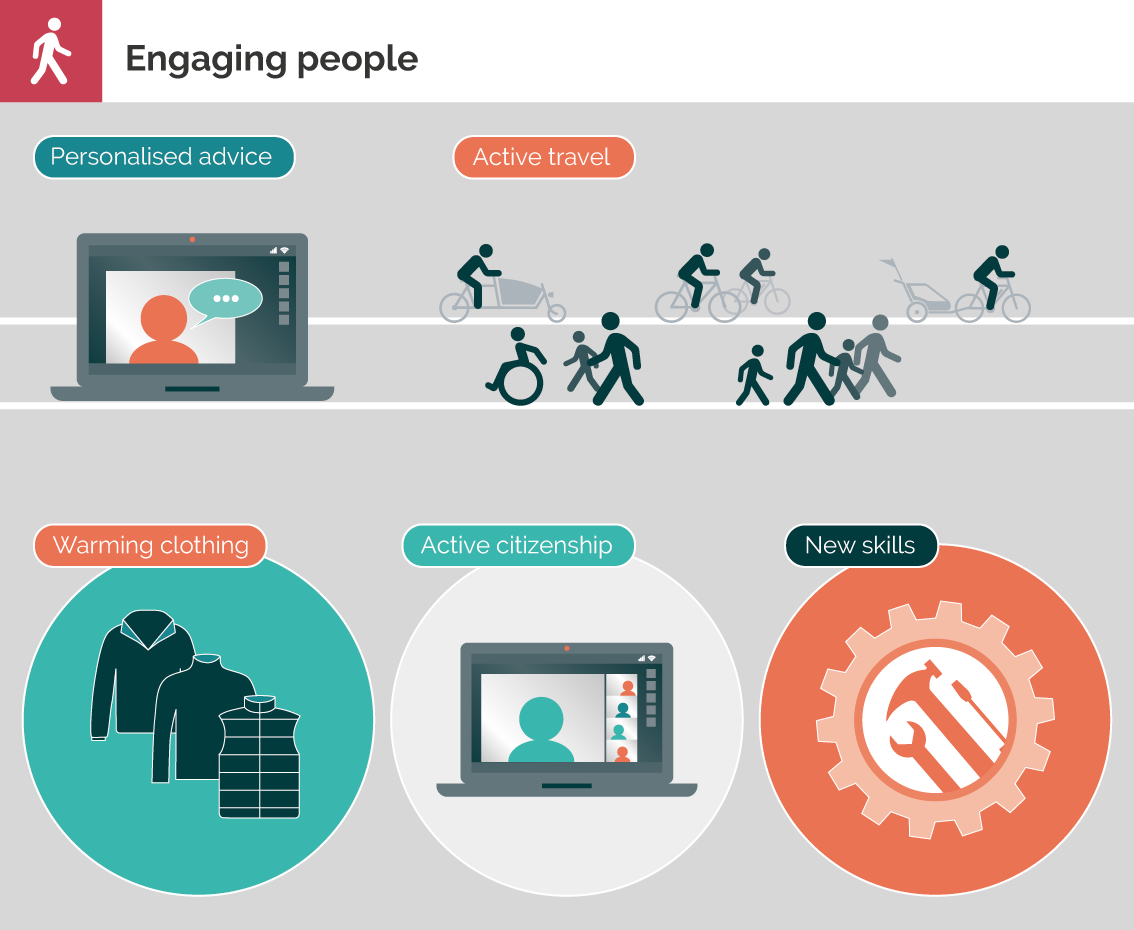
People will play critical roles in energy saving and systems change. Better technologies only have a positive impact if they are adopted and used appropriately.
Changing energy service demands to deliver energy saving implies changing habits, practices or lifestyles; and changing technology requires active support. People need to be supported and/or engaged in various aspects of the transition: as energy users, as citizens and as decision-makers in the wide range of production and services that constitute the transition [1].
Two vital technology transitions – to electric vehicles and low-carbon home heating – rely on major shifts in consumer purchases. However, energy is often not the most important driver of choice, for example most users of smart technologies consider convenience, security and time savings to be more important [2], see Digitalisation.
To support low carbon technology choices and behaviours, generalised information is insufficient. People face decisions that are specific to their own lives, homes and travel needs. Personalized information can help and smart meters can assist in providing this, but they are a facilitator rather than a driver of change [3]. Energy advice, i.e., guidance specific to personal circumstances is needed, particularly for vulnerable households [4], see Equity in the zero-carbon energy transition, in the face of rapid price rises and more complex technology options [5], see The energy affordability and security crisis.
Voluntary change within existing frameworks will be insufficient; nudges are not enough. Behaviour change is largely an outcome of investment in sustainable infrastructure, stronger regulation and economic incentives, rather than an easy alternative to them [6].
To make more significant savings, we need public engagement with rethinking how energy service and accessibility needs can be met in socially acceptable ways. Some ‘pro-environmental behaviours’, such as recycling, are now well-established, enabled by supportive infrastructure such as convenient collection systems and reinforced by social norms. Currently, some energy saving options challenge dominant narratives and social norms, for example changes to use of cars and mobility [7] and comfort and heating [8]. More attention to emotional attachments [9]. New business models may create new options, for example prosumer-centred energy business models as an alternative to energy as a commodity purchase [10]. Reconceptualising energy as a provider of services [11] allows extension of the range of solutions, for example to the fashion industry as a provider of warmer clothes [12].
People have a wider role in energy systems as citizens. CREDS researchers have been active in providing information in Citizens’ Assemblies on climate change at national and local levels [13]. Our experience is that, when faced with the decisions implied by climate concerns, people are able to consider and generally support change, both as users and service providers.
The energy transition has profound implications for the types and skills of jobs in the economy. Most ‘just transition’ attention is focussed on unsustainable supply sectors, as whole industries disappear. But changes within sectors are likely to be more significant, as investment and operations move towards compatibility with zero-carbon goals. In particular, across the construction sector, improving skills will require higher levels of accreditation and professionalisation. The sector currently operates in a low-skills equilibrium which makes it difficult to produce low-energy buildings or retrofit to the depth and quality needed [14].
Evidence
- The expected role of individuals in the transition to net zero: policies and pathways facilitating an active role | Research paper, 2022
- Knowledge, energy sustainability, and vulnerability in the demographics of smart home technology diffusion | Research paper, 2021
- Global sustainability, innovation and governance dynamics of national smart electricity meter transitions | Research paper, 2021
- Identifying double energy vulnerability: A systematic and narrative review of groups at-risk of energy and transport poverty in the global north | Research paper, 2021
- The energy price crisis – issues for energy use | CREDS Policy brief 023, 2022
- Policy for energy demand reduction | CREDS Policy brief 012, 2020
- Energy and transport planning | Research paper, 2021
- Humanizing heat as a service: Cost, creature comforts and the diversity of smart heating practices in the United Kingdom | Research paper, 2020
- The place of emotions in motivating domestic energy retrofit | CREDS blog, 2023
- Beware the value gap: Creating value for users and for the system through innovation in digital energy services business models | Research paper, 2021
- The history of heat-as-a-service for promoting domestic demand-side flexibility: lessons from the case of budget warmth | Research paper, 2021
- Rethinking energy services: The concept of ‘meta-service’ and implications for demand reduction and servicizing policy | Research paper, 2018
- UK Climate Assembly findings: this crisis needs leadership | CREDS blog, 2020
- Building on our strengths: A market transformation approach to energy retrofit in UK homes | CREDS & Federation of Master Builders report, 2021
Banner photo credit: Pat Whelen on Unsplash
